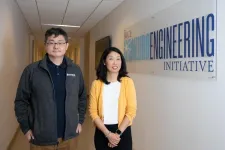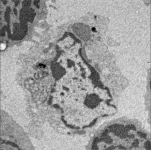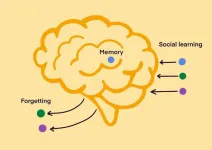(Press-News.org) A team of researchers led by Brent Sumerlin, the George B. Butler Professor in the University of Florida Department of Chemistry, has made a breakthrough with the potential to transform how we recycle plastics. Their innovative approach to working with polymers has led them to develop a new method for recycling that promises to lower the energy requirement without sacrificing the quality of the plastic.
It’s no secret that the U.S. and the Earth at large have a pressing plastic problem. Despite a meteoric rise in usage over the past few decades, only about 10% of our plastic currently ends up getting recycled.
“Our work is a response to the call to action proposed by the United Nations’ Sustainable Development Goals,” said Sumerlin. “New recycling strategies have become imperative to reduce the negative impact of plastic on the environment.”
The plastic recycling process typically involves three key stages: collection, sorting, and reprocessing. Collection of consumer waste relies on individuals placing recyclables into designated bins, which are later picked up by recycling collectors. Subsequently, sorting takes place at recycling plants, where workers organize the collected plastics to sift away the non-plastic materials and group similar plastics together for reprocessing.
Sumerlin’s team targeted the problems often encountered in the final reprocessing stage, where the sorted plastics are typically broken down into smaller pieces before being melted together and molded to create new products. This approach often produces lower-quality recycled plastic, as the polymer molecules that comprise these plastics are broken down into shorter segments.
Instead of this industry-standard thermal reprocessing, Sumerlin’s team explored a different approach called chemical recycling. Their experimental yet promising strategy induces depolymerization of the polymers so that they revert completely back to the much smaller monomer molecules from which they were originally made. The resulting monomer can then be used to prepare new polymers with similar or better properties than the plastics from which they were derived.
While this approach has already proven to be industrially feasible, Sumerlin’s team of graduate students developed a completely new method that dramatically lowers the energy required to achieve depolymerization. This experimental work was carried out by a team of researchers in Sumerlin’s group and was led by graduate students James Young and Rhys Hughes.
“Not only does this allow recycling of plastics with less energy, but it also enables access to plastics of even better quality,” said Sumerlin.
Polymer research at UF has continued to receive significant attention and funding in recent years. In April, Sumerlin and colleague Austin Evans received a prestigious MURI Grant from the Department of Defense to propel their research in this field. These groundbreaking discoveries may be just the first steps toward unlocking the full potential of polymers. For now, thanks to the efforts of Sumerlin and his team, the future of recycling is ablaze with possibilities, promising a greener and more sustainable tomorrow.
END
Breakthrough polymer research promises to revolutionize recycling
2023-08-07
ELSE PRESS RELEASES FROM THIS DATE:
New study in JNCCN highlights rapid adoption of clinical research results into chemotherapy prescribing patterns
2023-08-07
PLYMOUTH MEETING, PA [August 7, 2023] — New research in the August 2023 issue of JNCCN—Journal of the National Comprehensive Cancer Network evaluates how an important analysis on local-regionally advanced colon cancer adjuvant chemotherapy impacted prescribing patterns. The IDEA collaboration included more than 12,000 patients with Stage III colon cancer across 6 randomized phase 3 trials in a planned pooled analysis, to determine how three or six months of post-surgery chemotherapy—either a combination of capecitabine/oxaliplatin (CAPOX) or fluorouracil/leucovorin/oxaliplatin ...
American Heart Association CEO again honored as elite nonprofit leader, health equity champion
2023-08-07
DALLAS, August 7, 2023 — Nancy Brown, chief executive officer of the American Heart Association, has again been recognized for elite leadership in the 26th annual listing of The NonProfit Times Power & Influence Top 50. For more than three decades, The NonProfit Times has been a leading trade publication providing news, information and insight into nonprofit management.
Brown, who is now appearing for the 8th time on this list, was recognized specifically for her leadership as a champion for equitable health. The NonProfit ...
Department of Energy announces $4.7 million for research on integrative computational tools for systems biology research
2023-08-07
WASHINGTON, D.C. - Today, the U.S. Department of Energy (DOE) announced $4.7 million in funding for five new research projects in computational biology. These projects will develop new software and analytical tools to manage the growing quantities of genomics and other data stemming from the study of microbes and other biological systems.
“The Biological and Environmental Research (BER) Genomic Science program is at the forefront of using genome-enabled approaches to identify the basic principles that drive biological systems underlying functional processes of organisms,” said Todd Anderson, DOE Acting Associate Director for BER. “To gain ...
Tiny, flexible spinal probe system could lead to better therapies
2023-08-07
HOUSTON – (Aug.7, 2023) – The spinal cord is harder to access and study than even the brain. The challenges posed by its mobility and anatomical structure have made understanding exactly how it functions difficult.
Rice University engineers will work with collaborators to optimize an array of nanoelectronic threads, or NETs ⎯ already used successfully for gathering high-fidelity, long-term data from neurons in the brain ⎯ for use in the spine, supported by a $6.25 million, four-year grant from the National Institutes of Health.
In addition to neuronal activity recordings, NET probes can provide tunable, localized stimulation of adjacent neurons. Rice ...
Advancing environmental justice research and student engagement in energy
2023-08-07
HOUSTON, Aug. 7, 2023 – The Baker Hughes Foundation announced a $100,000 grant to the University of Houston Energy Transition Institute (ETI) to support environmental justice research and workforce development programs.
The institute, which focuses on the creation and use of reliable, affordable, environmentally responsible energy for all through a just and equity-driven pathway, is looking forward to using the grant to amplify its mission.
“Thanks to the generous support of the Baker Hughes Foundation, the UH ...
Carbon dioxide – not water – triggers explosive basaltic volcanoes
2023-08-07
ITHACA, N.Y. – Geoscientists have long thought that water – along with shallow magma stored in Earth’s crust – drives volcanoes to erupt. Now, thanks to newly developed research tools at Cornell, scientists have learned that gaseous carbon dioxide can trigger explosive eruptions.
A new model suggests that basaltic volcanoes, typically located on the interior of tectonic plates, are fed by a deep magma within the mantle, stored about 20 to 30 kilometers below Earth’s surface.
The research, which offers a clearer picture of our planet’s deep internal dynamics and composition, with ...
Inside job: Finding exposes unexpected killer of immune cells lacking self marker
2023-08-07
Researchers at Kobe University discovered an entirely new and unexpected mechanism by which the immune system can get rid of cells lacking molecules that identify them as part of the self in mice. The finding, published in PNAS, has possible implications for cancer treatment.
The immune system comprises many types of cells that work together to fight off diseases. Two important types are dendritic cells and T cells. Dendritic cells are located in strategic positions throughout the body including the gut and skin, as well as in the lymph nodes, sample their environment and present small components derived from these samples on their ...
Memory, forgetting, and social learning
2023-08-07
Social learning is typically thought to be most beneficial when the environments in which individuals live change quite slowly – they can safely learn tried and tested information from one another and it does not go out of date quickly. Innovating brand-new information, on the other hand, is thought to be useful in dynamic and rapidly changing environments.
Researchers Madeleine Ammar, Laurel Fogarty and Anne Kandler at the Max Planck Institute for Evolutionary Anthropology developed an agent-based simulation model of the evolution ...
New method to identify mutations in childhood brain tumors
2023-08-07
Researchers at Uppsala university have developed a new method to find mutations in brain tumors in children. They could also show that the mutations identified by them changes how cancer cells respond to a cancer drug. These findings could lead to better diagnostics and more individualized treatment of children with brain tumors. The study is published in the journal PNAS.
Medulloblastoma is the most common malignant brain tumor in children. It usually develops in the cerebellum and even if modern treatment has improved the prognosis so that over 70% live more than five years, not all patients ...
Climate influences the spread of a life-threatening zoonotic disease in the Amazon
2023-08-07
Outbreaks of polycystic echicnococcosis, a life-threatening zoonotic disease, are driven by regional climate changes, according to a study led by the Barcelona Institute for Global Health (ISGlobal), an institution supported by “la Caixa” Foundation. The findings, published in PNAS, provide evidence of the impact of climate on neglected tropical diseases in the Amazon region, with implications for other zoonoses.
Polycystic echinococcosis (PE) is a neglected life-threatening zoonosis caused by an intestinal worm (Echinococcus vogeli) ...



